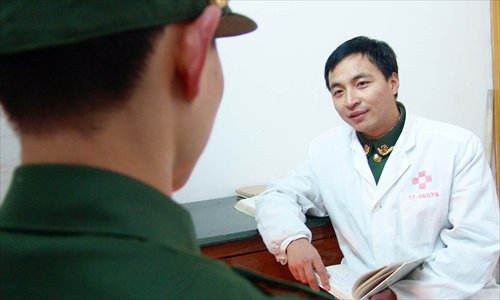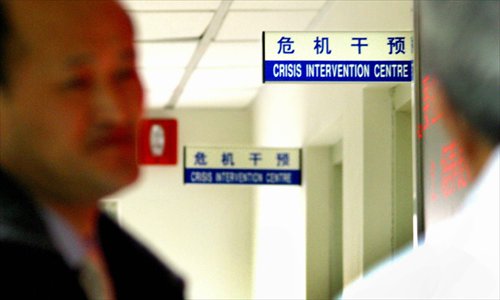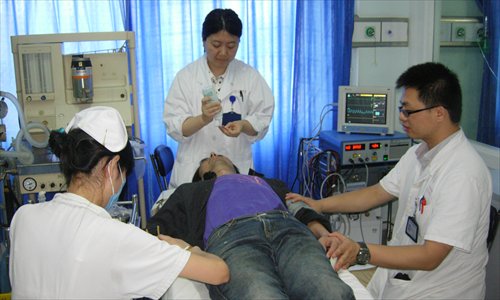Depression: a deadly disease

A mental patient undergoing counseling Photo: CFP
On March 24, a doctor surnamed Zhang of the Fudan University Shanghai Cancer Center jumped from the eighth floor of the in-patient department building. Although medical staff tried to save his life, he died shortly after. The hospital told media that the doctor had been battling depression for a long time and had been receiving treatment.
Depression is not a new word for Chinese people. Eleven years ago, on April 1, Hong Kong super star Leslie Cheung jumped from a hotel room and ended his life. He had also suffered from depression. A more positive example is the prominent CCTV host Cui Yongyuan, who was seriously affected by depression and said in an interview he had to quit his talk show because of it. After treatment over some years he has recovered.
As of 2011, suicide was the fifth cause of death in China, Xinhua reported. Annually about 287,000 people commit suicide and 2 million people attempt suicide. Suicide is the principal cause of death for people aged between 15 and 34 and has become a major public health and social problem.
Most suicides are triggered by mental illnesses including depression, schizophrenia and anxiety neurosis. Depression is the most dangerous. According to the Journal of Clinical Psychiatry, 50 percent of patients suffering depression have suicidal thoughts, 25 percent have attempted suicide and 15 percent actually commit suicide. How to prevent and treat depression has been an important issue for all.
Far from family
Chu (not his real name) is a 19-year-old boy. His father is the head engineer at a major State-owned enterprise but Chu suffers from depression. When Chu was in junior high school, he was diagnosed with mild depression and when he went to Australia several years ago to further his studies, he stopped taking his medicine and suffered difficulties with language and being far from friends and family.
Last winter, Chu returned to his home in Shanghai but mostly stayed by himself in his room. One day when his mother went into the room she found him making a noose of rope and stringing it around his neck. She immediately phoned his doctor and then took the young man to the Xuhui Mental Health Center.
Zhan Guilai is the executive vice head of the center and Chu's doctor. To diagnose and begin treating the troubled teenager, Zhan tested him using the Hamilton Depression Rating Scale (HAM-D). The young man scored 21 indicating he was definitely depressed. A score over 24 means the subject has severe depression and scores below seven indicate normality.
Talking to the young man, Zhan learned that Chu's depression partly stemmed from the fact that he had difficulty studying and he had guilty feelings because his parents had spent a great of money so that he could study abroad but he had been unable to adapt to life and study overseas.

Photo: CFP
Zhan treated Chu with medicine and therapy and after three months, the young man had improved. On his last two consultations Chu scored under seven on the HAM-D assessment.
Zhan told the Global Times that depression was usually divided into exogenous or endogenous states. Exogenous depression is triggered by an incident that causes the subject to feel depressed. Endogenous depression is caused by genetic factors although it can also be triggered by an outside event. Chu's depression was a typical exogenous form of depression, caused by outside factors and stress.
Although depression itself has only relatively recently been accepted as a distinct illness, the incidence of diagnosed depression has been rising steeply. Modern lifestyles, competitiveness, social conflict and city life are pushing more and more people into suffering depression. In China the diagnostic standards for depression have been modified and now reflect international standards.
In the past, in China, a diagnosis of depression had to include three distinct symptoms - physical lethargy, non-communicativeness and feelings of sadness. Today other symptoms like fatigue, low self esteem, sleeping difficulties and some physical indications can be involved.
"Depression is an illness. From the scientific point of view, a mental illness is the same as an organic illness. It has nothing to do with will power or moral traits. Illness cannot be controlled by thought," Zhan explained. He thinks suicide triggered by depression should not be criticized as a moral failing.
An embarrassment
Depression and mental illness are not rarefied problems. In China it is estimated that 17 percent of the population suffer from a diagnosable mental disorder and up to 4 percent of these suffer from depression. But although a significant number of people are affected it seems few take their problems to doctors. "Society is progressing but for a number of people, being mentally ill is still an embarrassment," Zhan said.

A patient undergoes modified electro-convulsive therapy at the Xuhui Mental Health Center. Photo: Wang Zhefeng/GT
Suicide watch
Li Chenhu is another psychiatrist with the Xuhui Mental Health Center. He said if someone has attempted suicide in the past they were three times as likely to attempt suicide again. If he finds a patient who has had suicidal thoughts he always suggests they be admitted to hospital.
"During a consultation some of these people can appear quite well and talk readily but that's misleading. Some hospital patients pretend they are fine so that we relax our vigilance and don't expect them to try suicide," Li said.
One of the charge nurses at the Xuhui Mental Health Center, surnamed Chen, explained the problems staff faced when dealing with suicidal patients. These patients have to be searched upon admission and staff remove potentially "dangerous" items like ropes, scissors, glasses, coins and buttons. Then the patient will be placed on a 24-hour watch.
"It's a difficult and demanding job. We are always stressed." However careful they are though some tragedies are hard to avoid. One case saw a man quietly unscrew a large sharp screw in his room and then swallow it which caused serious internal haemorrhaging and death. "We can only try our best."
Sometimes for serious cases where patients might be inclined to self harm, the center will give them modified electro-convulsive therapy (MECT) which works more rapidly than counselling and drugs.
"In past times, we used electro-convulsive therapy to treat severely ill people but now we used MECT and it is not painful or dreadful. The process is conducted under anesthesia and the patient just sleeps for a while," explained a psychiatrist, named Shi, who is in charge of MECT treatment at the center.
Shi said MECT could be compared to rebooting a computer - it was like starting the brain again to correct inappropriate brain waves. "Generally, three to five treatments control the illness." Shi said although MECT may have some side effects like memory loss these were not permanent and patients recovered.
Long term
Treating depression is a long-term battle. Clinically, a patient whose symptoms are two-thirds relieved can be considered cured. Patients will usually stay for three months in hospital and then doctors will try to ensure that they continue to take drugs for another two years. But after treatment the patient faces another hurdle.
"After a wound has healed the skin is scarred for a long time. Human beings are complicated emotionally. Sometimes, one incident can scar a person for life. We have to respond positively and scientifically," Zhan said emphasizing that the attitudes of the people around the patient are crucial.
Prevention is more important than treatment. In September, 2013, the Xuhui Mental Health Center opened the first district-level psychological crisis intervention center in Shanghai. It works with police, educational and other authorities presenting diverse activities in communities to teach residents about depression and how to find help if they feel unwell mentally. "Early screening is important. This helps our doctors get to potential patients, instead of waiting for them to come here."
Zhan said the disease of depression was not the same as sadness. "Everyone feels some sort of depression in his or her life, but the disease has to be diagnosed properly and it needs professional care."